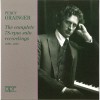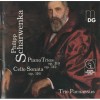Biography
Ludwig Philipp Scharwenka (February 16, 1847, Samter, Grand Duchy of Posen – July 16, 1917, Bad Nauheim) was a German composer and teacher of music. He was the older brother of Xaver Scharwenka.
He was born in Szamotuły (Samter), Grand Duchy of Posen. Like his younger brother Xaver he received his first intermittent musical instruction in Posen. After the closure of the Gymnasium (college) in 1865 he studied music theory together with his brother under Richard Wüerst and Heinrich Dorn at the new Musical Academy in Berlin where, from 1868, he himself was taken on as teacher of Theory and Composition. In this period his own first compositions appeared. In 1874 he brought out an overture and a symphony for the first time in a concert of his own.
His many teaching obligations notwithstanding, Philipp Scharwenka stood in the front line as a composer and was recognised as such during his lifetime. His compositions include three Symphonies, Symphonic Poems, a Violin concerto,[2] some Choral works (of which Sakuntala became very famous), the 4-act opera Roland, as well as numerous instrumental works such as Sonatas, Quartets, Caprices and Dances. Many of the major conductors of the period, including Arthur Nikisch, Anton Seidl and Hans Richter, performed his orchestral works. He is still known for his chamber works, including two piano trios,[3] two trios for violin, viola, and piano,[4] two violin sonatas,[5] one viola sonata,[6] one cello sonata,[7] two string quartets,[8] and one piano quintet.[9]
In contrast to his brother's very extrovert compositions, Philipp's many-sided work has dreamlike and thoroughly moody inflexions. His best-liked works are the chamber works beginning in 1896, which maintain traditional formal models and show considerable variety of melodic and rhythmical invention. In them Scharwenka achieved (despite the conservative restraints of the time in which he was writing) through very refined compositional techniques, something approaching an impressionistic tonal palette. These works found such distinguished interpreters as Willy Burmester, Julius Klengel and Moritz Meyer-Mahr.
One of his admirers was Max Reger, who in 1898 dedicated his Phantasiestücke op. 26 to him. In the context of the 37th Composer-Congress in 1900, his Dramatic Fantasy for Orchestra op 108, being crowned with a prize by the National German Music-Society, was performed in Bremen.








